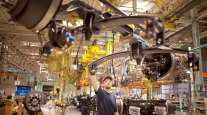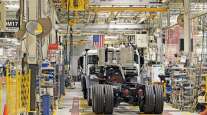Senior Reporter
Class 8 Orders in May Begin New Cycle’s Slow Upturn

[Stay on top of transportation news: Get TTNews in your inbox.]
North American Class 8 orders in May fell below 7,000, ACT Research reported, an uptick from April’s historic low as industry analysts said progress will be slow as long as COVID-19 remains a major concern.
Orders were 6,700 compared with 10,886 a year earlier. Orders in April fell to 4,100, the lowest since 1995.
“We have taken the first step back to whatever normal is now. I think we are going to see some pretty significant hits on productivity just as we try to accommodate and do the right things to keep people safe, and from getting sick,” ACT Vice President Steve Tam said. “And while it is the right thing to do, it is just going to take more time and resources. It’s going to slow things down.”

Tam
Add to that snags in the supply chain, parts of which also are struggling to flow smoothly again amid the pandemic, Tam said. “Truck makers may be planning at one level, but they are not able to execute at that level. And then lost momentum kind of slows the recovery down a little bit, too.”
FTR pegged the orders at 6,600.
“The number is very consistent with a slower comeback,” said Don Ake, vice president of commercial vehicles at FTR. “You can’t separate the ongoing overall health issue from how the people at the fleets feel about everything, in general — is the virus contained, is the spread of the pandemic coming down, what’s the status of my area?”
Ake said he has heard some fleets canceled orders in the short term, while “a lot” of quotes remain open and haven’t been closed because fleets are waiting and watching to make sure freight stabilizes.
Meanwhile, the number of Americans out of work tallies more than 40 million, or 25% of the total workforce.
That means consumer buying power, which spurs freight demand, is just “evaporating” from the economy, Tam said.
One truckload carrier is reducing the number of vehicles used in 2020 to hit the right operational size, a company executive said.
“By the end of 2020, the size of our operational tractor fleet is expected to be down 12% to 14% compared to the end of 2019” when it had 3,021 tractors, Richard Cribbs, treasurer of Covenant Transportation Group, said during the company’s most recent earnings call in May.

Covenant Transport
Going by the wayside will be its lower performing freight, he said, “where some shippers are not willing to sufficiently compensate us, during the immediate term, before freight demand returns and truckload oversupply is corrected.”
Covenant Transportation Group Inc. ranks No. 42 on the Transport Topics Top 100 list of the largest for-hire carriers in North America.
Cribbs added the ongoing weakness in first-quarter truck sales and leasing markets resulted in a $700,000 pre-tax loss from its 49% equity investment in Transport Enterprise Leasing. That compared with pre-tax income of $3 million in the first quarter of 2019.

How can trucking companies adjust to ensure that essential freight keeps moving while protecting their workers from coronavirus? Host Seth Clevenger speaks with Lilli Chiu of Hub International and Dave Cox of Polaris Transportation. Hear a snippet, above, and get the full program by going to RoadSigns.TTNews.com.
Ake said the industry continues to be cyclical. “Just because you had an artificial element that caused the downturn this year, we will go back on the cycle,” he said.
That’s good news for startup truck maker Nikola Corp., which began trading as a public company the day after ACT reported the orders, and is looking to begin producing a Class 8 battery-electric model in the second or third quarter of 2021.
RELATED: Nikola Goes Public; Class 8 Battery-Electric Vehicle Due in 2021
The cabover Nikola Tre will be made in Europe for its primary market, but some will be shipped to the United States, said Trevor Milton, founder and executive chairman of Nikola.
In addition to the pandemic’s withering effect on normal commerce “another reason why truck sales have gone down so much is because zero-emissions solutions are now becoming available by Nikola, and the fleets are calling us asking how quick we can get trucks into their hands. They want to migrate away from diesel,” Milton told Transport Topics. “The Tesla Semi is another reason they are not buying diesel trucks. You have us and Tesla, and we both are kicking butt. There’s enough room for five of us.”
Nikola intends to market its trucks through relationships with existing truck dealers, Milton said. “Now we can grow faster than we ever dreamed of,” he said, although details are still being worked out.
Industry watchers said it’s hard to understand why Nikola engages with its competitors, and will have to negotiate with every truck manufacturer and be beholden to them and compete against them.
Meanwhile, FTR is looking for a big upturn in 2023, Ake said.
“I think in that case, it’s a good time to have alternative energy trucks in the market, because people are going to be buying a lot of trucks in general, and it gives you a good marketing opportunity,” Ake said.
Want more news? Listen to today's daily briefing:
Subscribe: Apple Podcasts | Spotify | Amazon Alexa | Google Assistant | More



